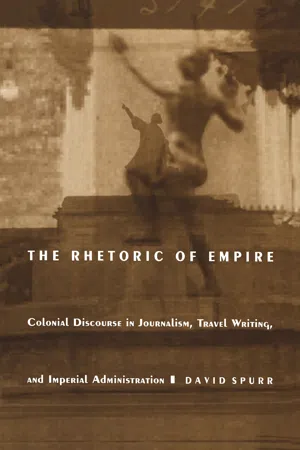
Post-contemporary interventions
Colonial Discourse in Journalism, Travel Writing, and Imperial Administration
- English
- PDF
- Available on iOS & Android
Post-contemporary interventions
Colonial Discourse in Journalism, Travel Writing, and Imperial Administration
About This Book
The white man's burden, darkest Africa, the seduction of the primitive: such phrases were widespread in the language Western empires used to talk about their colonial enterprises. How this language itself served imperial purposes--and how it survives today in writing about the Third World--are the subject of David Spurr's book, a revealing account of the rhetorical strategies that have defined Western thinking about the non-Western world.
Despite historical differences among British, French, and American versions of colonialism, their rhetoric had much in common. The Rhetoric of Empire identifies these shared features—images, figures of speech, and characteristic lines of argument—and explores them in a wide variety of sources. A former correspondent for the United Press International, the author is equally at home with journalism or critical theory, travel writing or official documents, and his discussion is remarkably comprehensive. Ranging from T. E. Lawrence and Isak Dineson to Hemingway and Naipaul, from Time and the New Yorker to the National Geographic and Le Monde, from journalists such as Didion and Sontag to colonial administrators such as Frederick Lugard and Albert Sarraut, this analysis suggests the degree to which certain rhetorical tactics penetrate the popular as well as official colonial and postcolonial discourse.
Finally, Spurr considers the question: Can the language itself—and with it, Western forms of interpretation--be freed of the exercise of colonial power? This ambitious book is an answer of sorts. By exposing the rhetoric of empire, Spurr begins to loosen its hold over discourse about—and between—different cultures.
Frequently asked questions
Information
Table of contents
- Contents
- Acknowledgments
- Introduction
- 1. Surveillance: Under Western Eyes
- 2. Appropriation: Inheriting the Earth
- 3. Aestheticization: Savage Beauties
- 4. Classification: The Order of Nations
- 5. Debasement: Filth and Defilement
- 6. Negation: Areas of Darkness
- 7. Affirmation: The White Man's Burden
- 8. Idealization: Strangers in Paradise
- 9. Insubstantialization: Seeing as in a Dream
- 10. Naturalization: The Wilderness in Human Form
- 11. Eroticization: The Harems of the West
- 12. Resistance: Notes Toward an Opening
- Bibliography
- Index